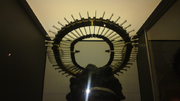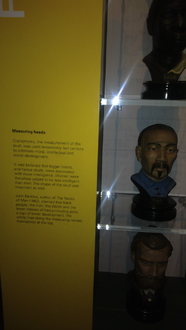This action plan comes out of the Valuing Diverse Skills sessions held at AdaCamp on January 14 2012, and the aim is to see if energy can be gathered behind an initiative to create a resource on Valuing Diverse Skills to help those in industry, open technology and culture who would like to use it.
From the outset its intended to be a collaborative effort, without a dictator (benign or otherwise). Everything in this plan is (currently) up for discussion. Later if things really get happening some stuff may need firming up so it can be built on, but even then if its the going the wrong way that is important to know so please feel free to question or contribute to any of this including the goals and terminology.
The Problem[]
Currently measurement of skills other than so-called "hard technical skills" is either non-existent, or so outdated as to be no better than the craniometry depicted in these photos from a Melbourne Museum exhibit. The text to the left in the photo that explains the exhibit reads:
- Craniometry, the measurement of the skull, was used extensively last century to estimate moral, intellectual and social development. It was believed that bigger brains, and hence skulls, were associated with more intelligence. Women were therefore judged to be less intelligent than men. The shape of the skull was important as well. John Beddoe, author of The Races of Man (1862) claimed that black people, the Irish, the Welsh and the lower classes all had protruding jaws, a sign of lower development. The white men doing the measurement ranked themselves at the top.
Check the notes from the session for more details, and of course it is part of this initiative to build up a good explanation of the issues.
How do we encourage better assessment of skills so that the knowledge and experience required - which women may have in great untapped amounts - can be actually measured instead of being ignored?

This craniometer was used to measure the outside of the skull and thus the intelligence of its owner.

Currently methods for assessing diverse skills are no better than the craniometry shown in this museum exhibit.
Terminology[]
- Technical Skills - specific skills such as coding in a particular language like C++, or a specific technical knowledge such as configuring Apache or administering a Linux computer. These are the skills commonly used in technology recruting & assessment to templatize people, and reduce them to a set of acronyms or key-words.
- Diverse Skills - skills other than purely technical skills which are vital to the success of technology projects but which nonetheless are under-valued or even not even discussed in technology recruitment & assessment. They include communication, running meetings, people management, managing team dynamics, project and resource management, distilling requirements, and operational work; plus a myriad others. Diverse skills can come from life experience, and a range of backgrounds - not just tertiary education related directly to ICT.
- Technology Recruitment & Assessment - this is the process by which people are selected to work in technology positions in industry, and open technology; and once in those positions rated for promotion, passing of probation and other gating processes related to what we commonly think of as success in our work lives.
Goals[]
- To increase participation of Women in technology by encouraging better recognition of skills of women
- This goal is aligned to and inspired by the goals of the Ada Initiative .
- To research diverse skills and women oriented technology recruitment & assessment.
- Hear, understand and acknowledge experiences of women
- Collect measurable evidence and convincing fact based materials that can be published
- To produce a valuable and actionable resource targetted for use by Industry and Open Technology
- The resource should be evidence based, and the guidance in it concrete
- For those targetted that have already decided they want to increase participation of women
Open Questions[]
These questions will hopefully be answered by the outcomes of the second goal above, the research effort. Its my belief that the answer to all of these is a resounding yes, but we need proof:
- Do women actually have more diverse skills than men statistically?
- Would it help participation of women if we valued those skills more effectively?
- Is it even possible to measure diverse skills?
- Are diverse skills actually valuable enough to be important measuring or caring about?